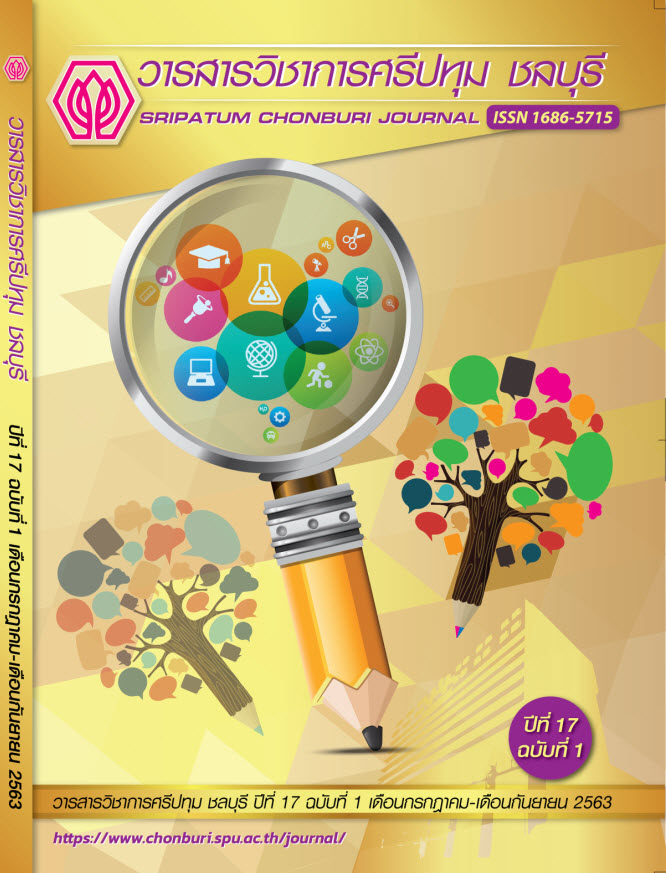THE DEVELOPMENT OF MOBILE LEARNING ON GEOLOGICAL TOOLS INTEGRATING LOCAL CURRICULUM, “KHORAT GEO-PARK” AND PROJECT-BASED LEARNING TO DEVELOP GEOLOGICAL SKILLS IN 8th GRADE STUDENTS
Keywords:
mobile learning lesson, project-based learning.Abstract
This research aimed to: 1) study the state of the learning process by using mobile learning lessons on geological tools integrating local curriculum “Khorat Geo-Park” with project-based learning to develop geological skills in 8th-grade students, 2) develop mobile learning lessons on geological tools integrating local curriculum “Khorat Geo-Park” with project-based learning to develop geological skills in 8th-grade students to achieve the efficiency criteria 80/80, and the effectiveness index (E.I) from 0.50 and higher with specific purposes including, 3) compare the learning achievement before and after learning of learners with mobile learning lessons on geological tools integrating local curriculum “Khorat Geo-Park” with project-based learning to develop geological skills in 8th-grade students, 4) compare geographic capability before and after learning of learners with the development of mobile learning lessons on geological tools integrating local curriculum “Khorat Geo-Park” with project-based learning to develop geological skills in 8th-grade students, 5) study learners’ satisfaction with mobile learning lessons on geological tools integrating local curriculum “Khorat Geo-Park” with project-based learning to develop geological skills in 8th-grade students, and 6) evaluate the quality of the students’ project after learning with mobile learning lessons on geological tools integrating local curriculum “Khorat Geo-Park” with project-based learning to develop geological skills in 8th-grade students. The samples were 30 students who were studying at the 8th-grade level, class 2/12 in semester 2 of the academic year 2019 of Sikhiu “Sawadphadungwittaya” School. The researcher implemented the mobile learning lessons on geological tools integrating local curriculum “Khorat Geo-Park” with project-based learning to develop geological skills in 8th-grade students.
The research methodologies were research and development (R & D) using mixed methods research. The conceptual framework of this research was the one-group pretest-posttest design. To evaluate the quality of mobile learning lessons for studying content consistency indexes-it is based on content validity criteria (IOC), analyzing the difficulty (P) and the classification power (r), and analyzing the confidence value of the test to find the effectiveness of mobile learning lessons using the data analysis model by finding the percentage, the mean, the standard deviation. The comparison of the mean using the t-test dependent samples and content analysis. The result revealed that the mobile learning lessons on geological tools integrating local curriculum “Khorat Geo-Park” with project-based learning to develop geological skills of the 8th-grade students, the efficiency of 8th graders was 82.27/81.83, respectively. The effectiveness index (EI) was 0.78, which means that the learners progress in their studies by 78.00% and with higher learning achievement after learning than before with statistical significance at the level of .01 and having higher geological skills after studying than before studying at the .01 level. The students were satisfied with the results, found that mobile learning lessons at the highest level, and the project quality of the learners after studying with free learning lessons at an excellent level.
References
การจัดการเรียนรู้แบบใช้โครงงานเป็นฐาน (project-based learning) ตอนที่ 1 (ออนไลน์). (2558). เข้าถึงได้จาก: https://candmbsri.wordpress.com/2015/04/08/%E0%B8%81%E0%B8%B2%E0%B8%A3%E0%B8%88%E0%B8%B1%E0%B8%94%E0%B8%81%E0%B8%B2%E0%B8%A3%E0%B9%80%E0%B8%A3%E0%B8%B5%E0%B8%A2%E0%B8%99%E0%B8%A3%E0%B8%B9%E0%B9%89%E0%B9%81%E0%B8%9A%E0%B8%9A%E0%B9%83%E0%B8%8A-2/ [2562, 23 พฤษภาคม].
ชัยวัฒน์ สุทธิรัตน์. (2561). 80 นวัตกรรมการจัดการเรียนรู้ที่เน้นผู้เรียนเป็นสำคัญ (พิมพ์ครั้งที่ 8). นนทบุรี: พี บาลานซ์ไซด์แอนปริ้นติ้ง.
ถนอมพร เลาหจรัสแสง. (2551). คอมพิวเตอร์ช่วยสอน. กรุงเทพฯ: วงกมลโปรดักชัน.
ทิศนา แขมมณี. (2559). ศาสตร์การสอน: องค์ความรู้เพื่อการจัดกระบวนการเรียนรู้ที่มีประสิทธิภาพ (พิมพ์ครั้งที่ 20). กรุงเทพฯ: สำนักพิมพ์แห่งจุฬาลงกรณ์มหาวิทยาลัย.
ธงชัย แก้วกิริยา. (2558). Mobile learning (m-learning) ก้าวสำคัญของการศึกษายุคใหม่ (ออนไลน์). เข้าถึงได้จาก:
http://www.tpa.or.th/tpanews/upload/mag_content/90/ContentFile1830.pdf [2562, 19 มกราคม].
พูลศรี เวศย์อุฬาร. (2551). M-learning (เอ็มเลิร์นนิ่ง) and U-learning การเรียนทางเครือข่ายไร้สาย (ออนไลน์). เข้าถึงได้จาก:
http://thaimlearning.blogspot.com/2007/02/mobile-learning-mlearning.html [2562, 19 มกราคม].
มนต์ชัย เทียนทอง. (2556). นวัตกรรม: การเรียนและการสอนด้วยคอมพิวเตอร์. กรุงเทพฯ: แดเน็กซ์ อินเตอร์คอร์ปอเรชั่น.
สุรางค์ โค้วตระกูล. (2554). จิตวิทยาการศึกษา (พิมพ์ครั้งที่ 10). กรุงเทพฯ: จุฬาลงกรณ์มหาวิทยาลัย
Liu, Huanglingzi, et al. (2008). An activity-oriented design framework for mobile learning experience. In Fifth IEEE Internatinal conference on
wireless, mobile and ubiquitous technology in education (pp. 185-187). Beijing, China: IEEE Computer Society Conference Pub.
Quinn, Clark. (2011). Designing mlearning: Tapping into the mobile revolution for organizational performance (Online). Available:
http://www.designingmlearning.com/author.html [2019, January 19].
Downloads
Published
Issue
Section
License
บทความทุกบทความเป็นลิขสิทธิ์ของวารสารวิชาการศรีปทุม ชลบุรี



